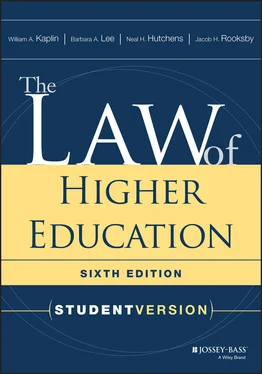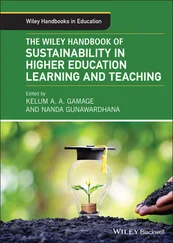1.4.2.5 Foreign and international law.In addition to all the U.S., or domestic, sources of law noted, the laws of other countries ( foreign law) and international law have become increasingly important to postsecondary education. This source of law may come into play, for instance, when the institution sends faculty members or students on trips to other countries, or engages in business transactions with companies or institutions in other countries (see Section 12.2.1), or seeks to establish educational programs in other countries or to offer programs online. (For a discussion of potential liability for injuriesthat may arise in study abroad programs, see Section 3.2.2.4.)
Just as business is now global, so, in many respects, is higher education. For example, U.S. institutions of higher education are entering business partnerships with for-profit or nonprofit entities in other countries. If the institution enters into contracts with local suppliers, other educational institutions, or financial institutions, the law of the country in which the services are provided will very likely control unless the parties specify otherwise. Such partnerships may raise choice-of-law issues if a dispute arises. If the contract between the U.S. institution and its foreign business partner does not specify that the contract will be interpreted under U.S. law, the institution may find itself subject to litigation in another country, under the requirements of laws that may be very different from those in the United States.
If the institution operates an academic program in another country and hires local nationals or draws from an international mix of employees to manage the program, or to provide other services, the institution must comply with the employment and other relevant laws of that country (as well as, in many cases, U.S. employment law). Employment laws of other nations may differ in important respects from U.S. law. For example, some European countries sharply limit an employer's ability to use independent contractors, and terminating an employee may be far more complicated than in the United States. Pension and other social security taxes are higher in many nations than in the United States, and penalties for noncompliance may be substantial. Tax treaties between the United States and foreign nations may exempt some compensation paid to faculty, students, or others from taxation. Definitions of fellowships or scholarships may differ outside the borders of the United States, which could affect their taxability. There is no substitute for competent local counsel to ensure that the institution is complying with all requirements pertaining to employees.
1.4.3 Internal sources of law.
1.4.3.1 Institutional rules and regulations.The rules and regulations promulgated by individual institutions are also a source of postsecondary education law. These rules and regulations are subject to all the external sources of law listed in Section 1.4.2and must be consistent with all the legal requirements of those sources that apply to the particular institution and to the subject matter of the internal rule or regulation. Courts may consider some institutional rules and regulations to be part of the faculty-institution contract or the student-institution contract (see Section 1.4.3.2), in which case these rules and regulations are enforceable by contract actions in the courts. Some rules and regulations of public institutions may also be legally enforceable as administrative regulations of a government agency (see Section 1.4.2.3). Even where such rules are not legally enforceable by courts or outside agencies, a postsecondary institution will likely want to follow and enforce them internally, to achieve fairness and consistency in its dealings with the campus community.
Institutions may establish adjudicatory bodies with authority to interpret and enforce institutional rules and regulations (see, for example, Section 9.1). When such decision-making bodies operate within the scope of their authority under institutional rules and regulations, their decisions also become part of the governing law in the institution; and courts may regard these decisions as part of the faculty-institution or student-institution contract, at least in the sense that they become part of the applicable custom and usage (see Section 1.4.3.3) in the institution.
1.4.3.2 Institutional contracts.Postsecondary institutions have contractual relationships of various kinds with faculties (see Section 5.2), staff (see Section 4.2), students (see Section 7.1.3), government agencies (see Section 11.4.1), and outside parties such as construction firms, suppliers, research sponsors from private industry, and other institutions. These contracts create binding legal arrangements between the contracting parties, enforceable by either party in case of the other's breach. In this sense a contract is a source of law governing a particular subject matter and relationship. When a question arises concerning a subject matter or relationship covered by a contract, the first legal source to consult is usually the contract's terms.
Contracts, especially with faculty members and students, may incorporate some institutional rules and regulations (see Section 1.4.3.1), so that these become part of the contract terms. Contracts are interpreted and enforced according to the common law of contracts ( Section 1.4.2.4) and any applicable statute or administrative rule or regulation ( Sections 1.4.2.2and 1.4.2.3). Contracts may also be interpreted with reference to academic custom and usage.
1.4.3.3 Academic custom and usage.By far the most amorphous source of postsecondary education law, academic custom and usage comprises the particular established practices and understandings within particular institutions. Academic custom and usage differs from institutional rules and regulations ( Section 1.4.3.1) in that custom and usage is not necessarily a written source of law and, even if written, is far more informal; custom and usage may be found, for instance, in policy statements from speeches, internal memoranda, and other such documentation within the institution.
This source of postsecondary education law, sometimes called “campus common law,” is important in particular institutions because it helps define what the various members of the academic community expect of one another as well as of the institution itself. Whenever the institution has internal decision-making processes, such as a faculty grievance process or a student disciplinary procedure, campus common law can be an important guide for decision making. In this sense, campus common law does not displace formal institutional rules and regulations but supplements them, helping the decision maker and the parties in situations where rules and regulations are ambiguous or do not exist for the particular point at issue.
Academic custom and usage is also important in another, and broader, sense: it can supplement contractual understandings between the institution and its faculty and between the institution and its students. Whenever the terms of such a contractual relationship are unclear, courts may look to academic custom and usage in order to interpret the terms of the contract. In Perry v. Sindermann , 408 U.S. 593 (1972), the U.S. Supreme Court placed its imprimatur on this concept of academic custom and usage when it analyzed a professor's claim that he was entitled to tenure at Odessa College:
The law of contracts in most, if not all, jurisdictions long has employed a process by which agreements, though not formalized in writing, may be “implied” (3 Corbin on Contracts , §§ 561–672A). Explicit contractual provisions may be supplemented by other agreements implied from “the promisor's words and conduct in the light of the surrounding circumstances” (§ 562). And “the meaning of [the promisor's] words and acts is found by relating them to the usage of the past” (§ 562).
Читать дальше












